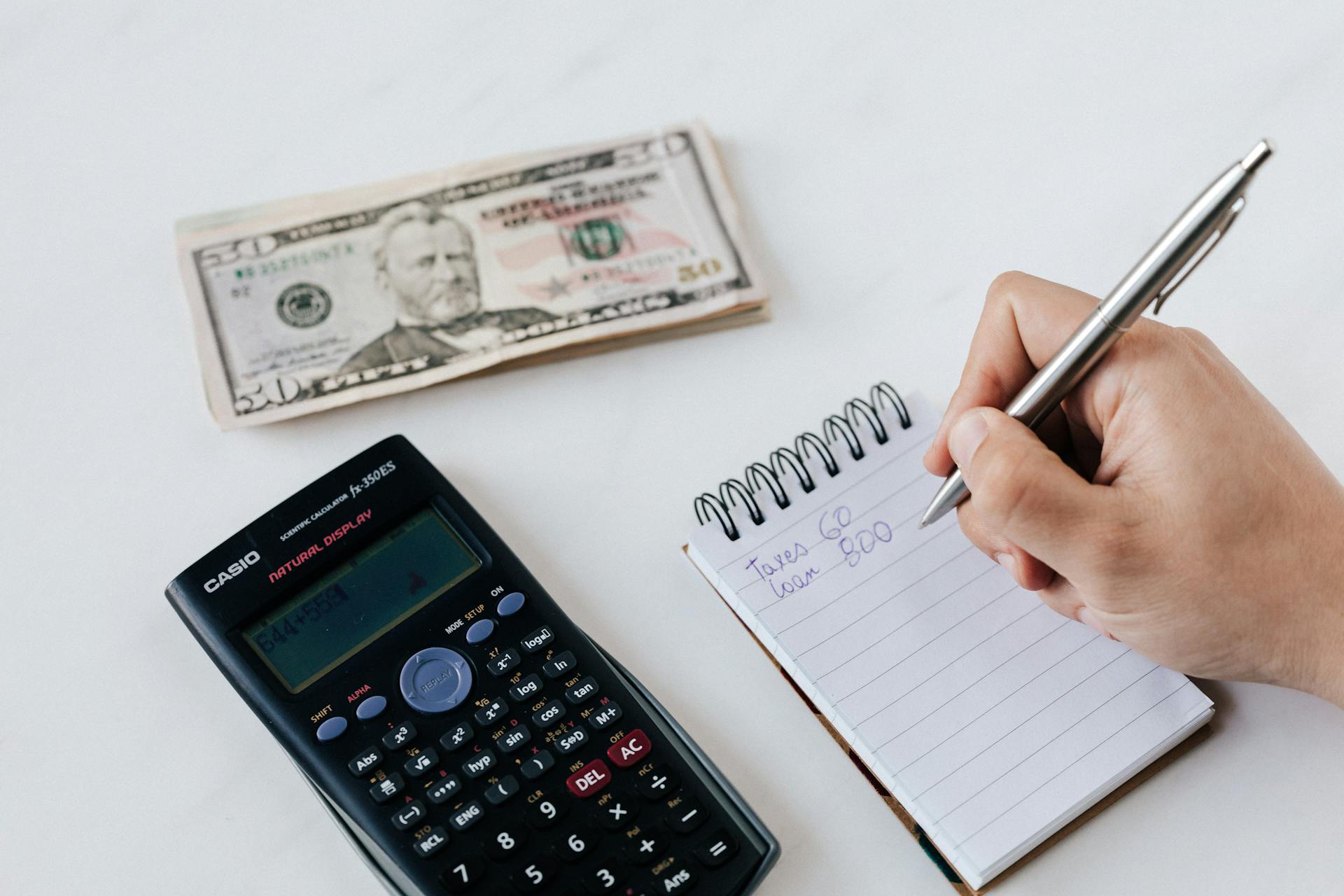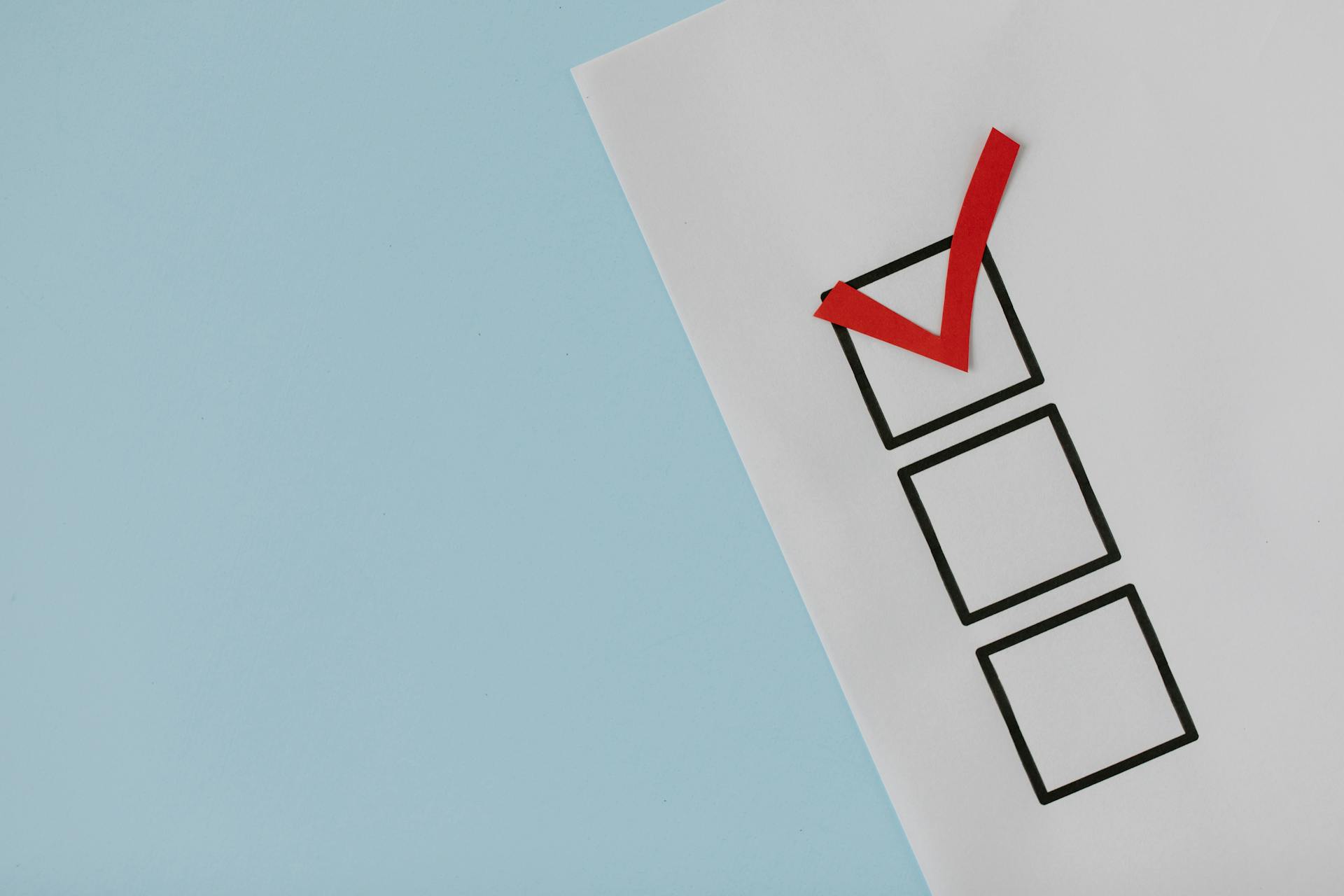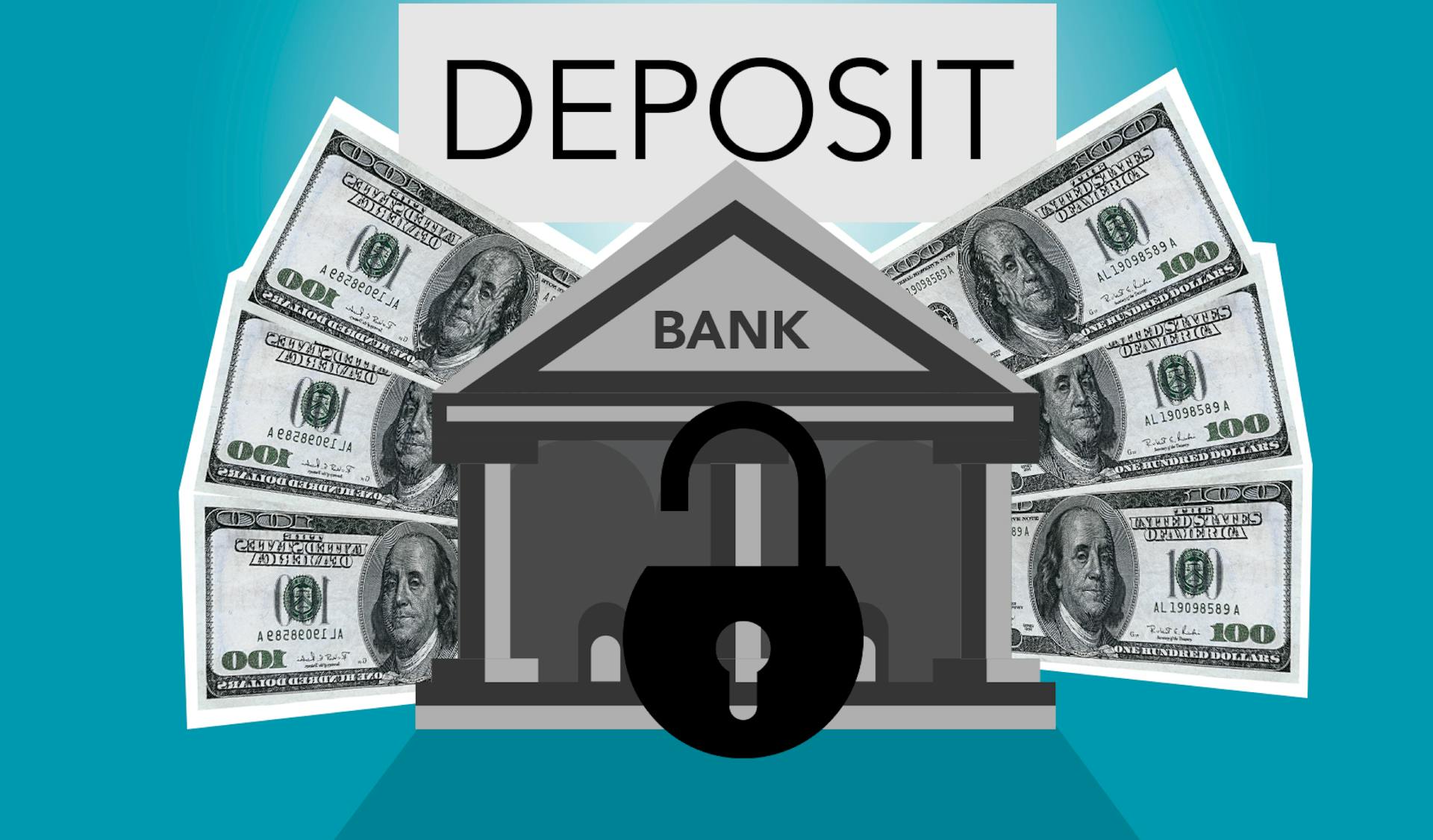
If you're planning to make a large purchase or pay a significant bill, you might be wondering about the difference between a bank check and a certified check. The truth is, both types of checks have their own unique characteristics, and understanding the differences can help you make an informed decision.
A bank check, also known as a personal check, is a common type of check that most people are familiar with. It's a check that's drawn on your personal checking account, and it's typically used for everyday transactions.
A certified check, on the other hand, is a type of check that's guaranteed by the bank. This means that the bank verifies the check's funds before issuing it, making it a more secure option for large transactions.
In general, bank checks are widely accepted, but certified checks are more secure and may be preferred by some merchants.
Related reading: Types of Cheque Book
What Is a Bank Check?
A bank check is a bill of exchange that guarantees a certain amount of money, essentially providing a way to instruct the bank to transfer funds from the payor's account to the payee's account.
Checks are typically written against a checking account, but they can also be used to move funds from savings accounts and other types of accounts.
The payor writes the check and gives it to the payee, who then takes it to their bank for cash or to deposit into an account.
Checks are generally seen as a more secure way of transferring money than cash, especially with large sums. If a check is lost or stolen, a third party is not able to cash it, as the payee is the only one who can negotiate the check.
A unique perspective: How to Check for Old Bank Accounts
Key Features and Types
A bank check is a written, dated, and signed draft that directs a bank to pay a specific sum of money to the bearer.
It's essential to note that a check instructs a financial institution to transfer funds from the payor's account to the payee or that person's account.
The standard features of a check include the date, the payee line, the amount of the check, the payor's endorsement, and a memo line.
In some countries, such as Canada and England, the spelling used is "cheque" instead of the more commonly used "check".
Here are the main types of checks:
- Certified checks
- Cashier's checks
- Payroll checks, also called paychecks
Bank Check vs Certified Check
A certified check is a personal check from an account that has been certified by a bank, ensuring the account holder's signature is authentic and the funds are available.
The funds for a certified check are drawn against the bank customer's account, whereas a cashier's check is drawn against the bank's funds, making it a more secure option for large-dollar transactions.
Certified checks are typically used in situations where the buyer and seller don't know each other, such as buying an expensive item from an online marketplace.
For your interest: Vanguard 529 Funds
Vs
A certified check is not the same as a cashier's check, although they're often used interchangeably. A certified check is drawn against the bank customer's account, whereas a cashier's check is drawn against the bank's funds.
A certified check verifies that the drawer's account has enough funds to honor the amount of the check, but it doesn't guarantee the funds are available until the check is presented at the bank from which it's drawn. On the other hand, a cashier's check offers guaranteed funds directly from the bank's account.
A certified check is a personal check from an account that has been certified by a bank, with a signature, stamp, or marking showing it's certified. A cashier's check, however, is an official bank check made payable to the person or business you're transacting with.
Both certified and cashier's checks can be considered "official checks", used instead of cash, credit, or personal checks to guarantee payment. However, if a cashier's or certified check is lost, you'll have to get an indemnity bond, which can be challenging.
A different take: Class B Shares
Return Check
A return check, also known as a bounced check, is a check that the bank refuses to pay because the account holder doesn't have enough money in their account.
The bank will then return the check to the payee, often with a notice that the check was returned due to insufficient funds.
In some cases, the bank may charge a fee for the returned check, which can range from $20 to $35.
The payee can then try to contact the account holder to collect the debt, or they can take further action to recover the funds.
Consider reading: Bofa Return Item Chargeback
Prevention and Protection
To avoid cashier's and certified check fraud, it's essential to be cautious about accepting checks from unfamiliar individuals or businesses. Verify the legitimacy of the sender before accepting any form of payment.
Always call or visit the bank that issued the check to confirm its genuineness. Look up the bank's contact information independently to ensure you are verifying with the correct institution.
Contact your financial institution to verify that the check has cleared and the funds are available in your account before proceeding with any transactions or releasing goods or services. This is crucial to avoid any potential losses.
Here are some steps to verify a certified check:
Guarding Against Fraud
Be cautious about accepting checks from unfamiliar individuals or businesses, as they may be fraudulent. Always verify the legitimacy of the sender before accepting any form of payment.
To verify a certified check, call the bank immediately upon receiving it, but don't call the number printed on the check. Instead, find the bank's phone number from their official website and give them the check number and the name of the purchaser.
For more insights, see: Wells Fargo Bank Verify Check
Some red flags of phony checks include typos and grammatical errors, but most bad checks don't have obvious giveaways. Counterfeiters can easily copy bank logos and branding off the internet, making it harder to spot fake checks.
To avoid cashier's and certified check fraud, verify that the check has cleared and the funds are available in your account before proceeding with any transactions or releasing goods or services. Contact your financial institution to confirm this.
Here are some essential tips to avoid cashier's and certified check fraud:
Be cautious about accepting checks from unfamiliar individuals or businesses.
Always call or visit the bank that issued the check to confirm its genuineness.
Contact your financial institution to verify that the check has cleared and the funds are available in your account.
If you receive a cashier's check, know that funds from a deposited cashier's check must be available the next business day, unless the bank places a hold on some of those funds if the check exceeds $5,252.
Bounced Check
A bounced check is a check that can't be processed because there are insufficient funds in the account. This can happen when you write a check for more money than you actually have.
The bank will return the check to you, and you'll likely face a penalty fee as a result. This fee can be a real nuisance.
In addition to the penalty fee, you might also be charged a monthly service fee, a per-check fee, or a check printing fee. These fees can add up quickly.
A bounced check can also lead to a returned deposit item fee, which is charged when you deposit a check that bounces. This can be frustrating if you're relying on that money.
It's a good idea to keep track of your account balance to avoid writing checks that will bounce. This can help you avoid those pesky penalty fees and other charges.
Explore further: What Happens to Options When Stock Splits
Lost: What to Do
Losing a cashier's or certified check can be a stressful experience, but knowing what to do can help minimize the impact. It's crucial to act swiftly.

The process for replacing a certified check is generally more straightforward, but it's still essential to follow the guidelines provided by the issuing bank.
To address the loss effectively, you need to contact the issuing bank immediately. They will guide you through the next steps.
Replacing a cashier's check may involve additional steps, such as obtaining an indemnity bond to protect the bank from potential losses.
Suggestion: Acquiring Bank vs Issuing Bank
Business and Costs
A certified check can be a reliable form of payment, but it comes with a cost. You can expect to pay between $5 and $15 for a certified check, depending on the bank.
Some banks, like Ally Bank, offer cashier's checks for free, while others charge a fee. For example, Bank of America charges $15 for cashier's checks, but Preferred Rewards program customers get them for free.
If you need to make a large transaction, a certified check may be a good option, but be aware that not all banks offer them. In fact, many banks don't offer certified checks, and even big banks like Bank of America may not have them available.
You might like: What Stores Offer Credit Cards
Here's a breakdown of the fees for certified and cashier's checks at some major financial institutions:
How Much Does It Cost?
A certified check can be a reliable form of payment, but it's essential to consider the cost. You can expect to pay between $5 and $15 for a certified check.
Many banks charge a fee for certified checks, with some charging as much as $20. However, some banks offer reduced fees or no fees for account holders.
Some banks, like Ally Bank, offer cashier's checks for free. On the other hand, Bank of America charges $15 for cashier's checks, but Preferred Rewards program customers get them for free.
Here's a breakdown of the costs for certified and cashier's checks at some major financial institutions:
Certified checks can be more expensive than other payment options, but they guarantee that the funds are available and the signature is authentic.
What's Best for Your Business?

When choosing a payment method for your business, consider the specific transaction and the level of security required. Cashier's checks offer guaranteed funds directly from the bank's account, making them ideal for high-value transactions where certainty is crucial.
The nature of your transaction is a key factor in determining the best payment method. For example, if you're dealing with unfamiliar parties, a certified check can provide assurance of payment without direct involvement from the bank.
Cashier's checks are often more convenient to obtain than certified checks, but they may come with associated costs. On the other hand, certified checks involve verifying the availability of funds in the customer's account, providing assurance of payment without direct involvement from the bank.
Ultimately, the choice between a cashier's check and a certified check depends on your business needs and preferences. Consider the convenience, costs, and level of security required for each transaction.
Here's a quick comparison of cashier's checks and certified checks:
Remember, learning how to use a check correctly can provide your business with a secure payment method that you may need or prefer to use in certain circumstances.
Where to Get Bank Checks
You can get bank checks from your bank's local branch, where you can order them online or in person. Many banks offer this service for free or for a small fee.
Some banks also offer online ordering and home delivery for a small additional fee, which can be convenient if you're short on time or live far from a branch.
For your interest: Employer Can Offer 457b Plan Means
Frequently Asked Questions
Does a certified bank check clear immediately?
Certified bank checks typically clear within one business day after deposit, making them a fast and reliable payment option. However, the exact clearing time may vary depending on the bank and other factors.
What is the disadvantage of a certified check?
Certified checks offer less buyer protection compared to cashier's checks or money orders. They are more secure than personal checks, but may not provide the same level of financial security for large transactions.
Sources
- https://www.investopedia.com/terms/c/check.asp
- https://tipalti.com/en-eu/payments-hub/certified-check/
- https://www.nerdwallet.com/article/banking/certified-check
- https://www.highradius.com/resources/Blog/cashier-check-vs-certified-check-whats-the-difference/
- https://www.bankrate.com/banking/checking/what-is-a-certified-check/
Featured Images: pexels.com


